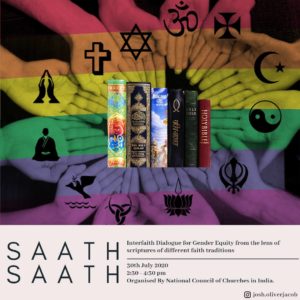NCCI condemns brutal rape of young dalit girl leading to her death as crime against humanity, initiates campaign to address caste based gender violence
National Council of Churches in India condemns the alleged gang rape and assault of 19 year young dalit girl in Hathras district of Uttar Pradesh leading to her death. The barbaric torture has led the victim to undergo an enormous amount of mental, emotional and physical suffering along with a dent on her dignity. Atrocities against women have increased now in India and in this case the victim was a Dalit and she was denied the basic dignity even in her funeral. Denial of dignified funeral was the ultimate of the turmoil for the family of the victim. This act exposes the vulnerability of women in India and especially the women belonging to the discriminated sections of the society such as the dalits, adivasi and tribals.
The alarming torture of gang rape on a girl cannot be neglected as it raises a serious concern on the security of women and girls in society and more importantly the rising toxic masculinity as assertion of power. We cannot neglect the alleged cutting off of the tongue which is a sign to silence a person and their community. We cannot remain silent now otherwise a whole generation will be lost due to brutality and lust of toxic masculinity.
This horrific incident is a blot on the affirmation of Human Rights, Right to Dignity of Life, Protection of dalits and Adivasi/ Tribal communities. The NCCI demands effective judicial action to be taken against the perpetrators of this crime and the officials involved in delaying the writing of FIR and doing a hurried non ritualistic funeral of the victim allegedly without consent of the family. The NCCI demands that speedy justice should be delivered to the victim and the bereaved family, and that protection be given to family members of the deceased as the family need moral and judicial help because they are vulnerable due to their economic and social status of being Dalits.
National Council of Churches in India calls upon the National Human Rights Commission to take appropriate measures to safeguard the constitutional rights that affirm life ‘OF’ all and life ‘FOR’ all to ensure justice without bias so that the rights and dignity of the members belonging to victimised and vulnerable communities will be protected. The NCCI will address such heinous caste based gender violence in its campaign leading to the Human Rights day involving the participation of its constituents.
Rev. Jyoti Singh Pillai Pradip Bansrior
Executive Secretary Executive Secretary
Women’s Concerns Dalit and Tribal/ Adivasi Concerns
Rev. Asir Ebenezer
General Secretary
National Council of Churches in India










 This worldwide women’s prayer movement started in 1956 in the Philippines by an Indian woman called Shanti Solomon who was on a peace mission with an international team of Presbyterian women to overcome the wounds between countries caused by World War II. Her visa to Korea was refused, and she had to stay in the Philippines while the others moved on. In her vision that prayer surpasses national boundaries she got the idea that each woman – even the poorest – can contribute whenever she prays for peace and reconciliation by setting aside her ’least coin’. She got her insights from the parable of the widow’s mite in the gospel. This ecumenical prayer movement spread quickly among the Asian countries and beyond. Today all continents are part of it. Women’s fellowships of different churches in the world promote FLC movement. Participating Ecumenical Organizations are.
This worldwide women’s prayer movement started in 1956 in the Philippines by an Indian woman called Shanti Solomon who was on a peace mission with an international team of Presbyterian women to overcome the wounds between countries caused by World War II. Her visa to Korea was refused, and she had to stay in the Philippines while the others moved on. In her vision that prayer surpasses national boundaries she got the idea that each woman – even the poorest – can contribute whenever she prays for peace and reconciliation by setting aside her ’least coin’. She got her insights from the parable of the widow’s mite in the gospel. This ecumenical prayer movement spread quickly among the Asian countries and beyond. Today all continents are part of it. Women’s fellowships of different churches in the world promote FLC movement. Participating Ecumenical Organizations are.